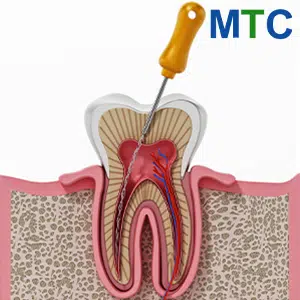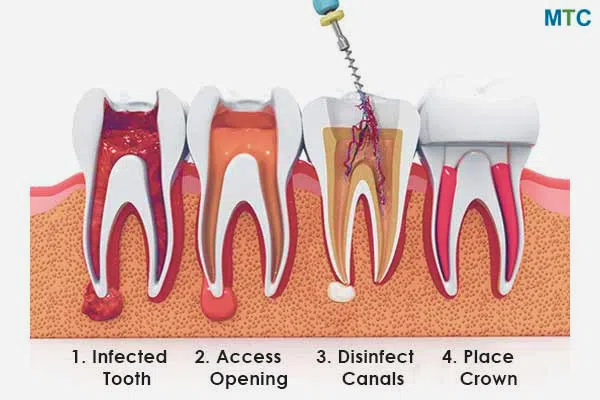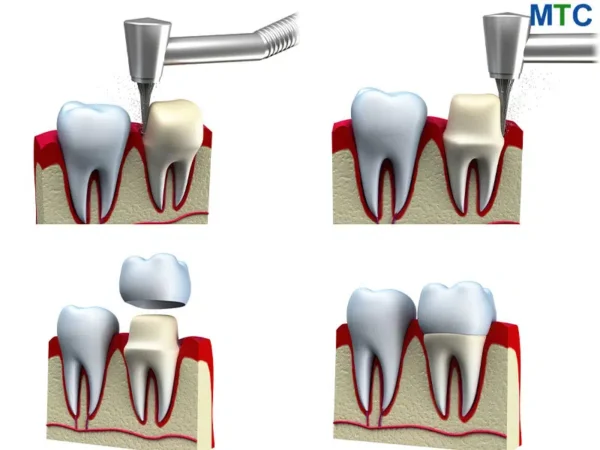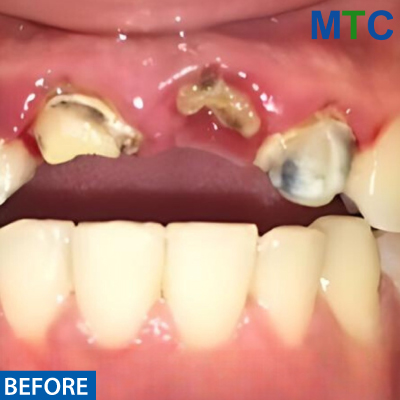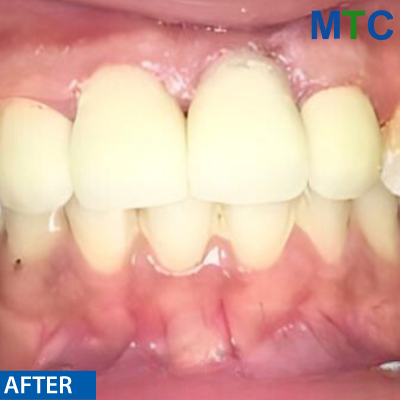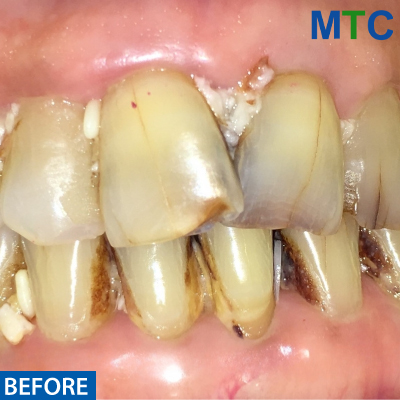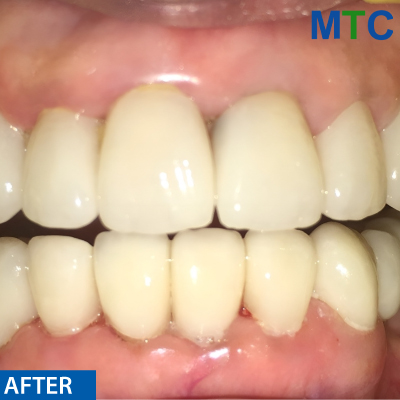Root Canal Treatment in Panchkula, Haryana: Painless RCT @ Affordable Packages
Explore root canal treatment in Panchkula, Haryana and save significantly compared to US and UK prices. Discover Panchkula’s clinic offering exceptional care with in-house CBCT and a dental microscope! With experienced dentists and NABH accreditation, Panchkula stands out as a premier destination for affordable RCT without compromising on quality.
How Much Does Root Canal Treatment Cost in Panchkula, Haryana?
The root canal treatment cost in Panchkula ranges from INR 8,000 ($96) to INR 12,000 ($145). The same treatment costs INR 83,000 to 1,25,000 ($1,100 to $1,500) in US or Canada.
This means you can get root canal or tooth decay treatment in Panchkula and save up to 92% on costs!
A single-sitting RCT in Panchkula, Haryana, costs about INR 12,000 ($120) and is performed under a dental operating microscope (DOM). This ensures the precise and accurate treatment outcomes at a fraction of the price!
These costs include removing the decayed part, removing the infected pulp, disinfecting and filling the root canals, and then core filling. Although prices may seem higher than other centers, the quality and accuracy provided using the DOM justify the expense.
Refer to the table below for a better understanding:
| Procedure | Panchkula (USD) | US/Canada (USD) | Savings % |
| RCT (Anterior teeth) | $96* | $1,100 / $1,000 | 92% |
| RCT (Premolar teeth) | $120** | $1,300 / $1,150 | 91% |
| RCT (Molar teeth) | $145*** | $1,500 / $1,300 | 90% |
| *Multi-visit | **Single Visit | ***Retreatment (ReRCT) |
#Prices are case-dependent
The root canal treatment cost in Panchkula ranges from INR 8,000 (£80) to INR 12,000 (£115). Conversely, the same treatment costs INR 58,000 to 78,000 (£550 to £740) in the UK. This helps you save up to 85% on costs!
Moreover, a single-sitting RCT in Panchkula, Haryana, costs about INR 12,000 (£115 ) and is performed under a dental operating microscope (DOM). This ensures the precise and accurate treatment outcomes at a fraction of the price!
These costs include removing the decayed part, removing the infected pulp, disinfecting and filling the root canals, and then core filling. Although prices may seem higher than other centers, the quality and accuracy provided using the DOM justify the expense.
Refer to the table below for a better understanding:
| Procedure | Panchkula (GBP) | UK (GBP) | Savings % |
| RCT (Anterior teeth) | £80* | £550 | 85% |
| RCT (Premolar teeth) | £95** | £640 | 85% |
| RCT (Molar teeth) | £115*** | £740 | 84% |
| *Multi-visit | **Single Visit | ***Retreatment (ReRCT) | |
#Prices are case-dependent
The charges for root canal treatment in Panchkula, India ranges from INR 8,000 (A$145) to INR 12,000 (A$220). Conversely, the same treatment costs INR 1,11,000 to 1,50,000 ($2,000 to $2,700) in Australia. This helps you save up to 93% on costs!
Moreover, a single-sitting RCT in Panchkula, Haryana, costs about A$180 (INR 12,000) and is performed under a dental operating microscope(DOM). This ensures the precise and accurate treatment outcomes at a fraction of the price!
These costs include removing the decayed part, removing the infected pulp, disinfecting and filling the root canals, and then core filling. Although prices may seem higher than other centers, the quality and accuracy provided using the DOM justify the expense.
Refer to the table below for a better understanding:
#Prices are case-dependent
| Procedure | Panchkula, Haryana (AUD) | Australia (AUD) | Savings % |
| RCT (Anterior teeth) | A$ 145* | A$2,000 | 93% |
| RCT (Premolar teeth) | A$ 180** | ||
| RCT (Molar teeth) | A$ 220*** | A$2,700 | 92% |
| *Multi-visit | **Single Visit | ***Retreatment (ReRCT) | |
The Dental Pulp
The delicate central portion of the tooth is called the pulp. It consists of blood vessels and nerves.
Root canal treatment is required when the pulp is affected due to:
- Damage from injury, deep cavities, or infection.
- Severe pain, loose teeth, and swelling.
- Dental X-rays reveal pulp damage due to dental caries.
Infected Root Canal
When Do You Need Root Canal Treatment?
Wondering if you might need a root canal? Here’s when this treatment becomes necessary.
Understanding the signs and symptoms
Severe toothache while chewing or biting can indicate underlying pulp or nerve issues.
The sharp, throbbing pain can also radiate to the head, jaws and other parts of the face
Prolonged sensitivity to hot or cold that lingers even after the stimulus is removed may signal nerve damage that requires intervention.
Progressive or long-standing discoloration indicates irreversible damage to the pulp and warrants intervention.
Pus-filled sores on the gums or dental abscess lead to bad breath and a foul taste in the mouth.
Other symptoms often accompany them and suggest an active infection requiring RCT.
Swelling in the gums or surrounding tissues may extend beyond the immediate area, resulting in space infection.
This causes extreme discomfort and difficulty in breathing.
Seeking Treatment:
- Early intervention can prevent further complications.
- Ignoring toothache may worsen the infection.
- Consult your dentist if symptoms persist or worsen.
Source: AAE[1], NHS[2]
Root Canal Therapy: Benefits
Discover the advantages of root canal therapy and how it can help preserve your dental health.
- Infection: Root canal treatment clears infection, restoring oral health and comfort.
- Pain: RCT relieves severe tooth pain, promoting comfort and well-being.
- Preventing tooth loss: RCT saves natural teeth, avoiding extraction.
- Additional dental procedures: RCT reduces the need for multiple dental visits and procedures.
- Cost savings: RCT is cost-effective compared to tooth extraction and replacement options.
- Easy Maintenance: RCT requires minimal post-operative care, ensuring a hassle-free recovery.
- Prevents shifting of other teeth: RCT avoids tooth extraction and prevents adjacent and opposing teeth from shifting, which maintains proper alignment and bite.
- Pain-Free: RCT is painless, providing comfort during and after treatment.
- No need for Insurance: RCT in Panchkula, is so reasonable that it is easily affordable even without insurance.
- Quick and Easy: RCT is a short and straightforward procedure, sometimes completed in a single visit.
Source: AAE[3], Cleveland Clinic[4]
Steps in Root Canal Treatment
Root Canal Treatment in Panchkula, Haryana: Steps
Root canal treatment or endodontic therapy is a simple procedure that relieves discomfort and preserving your natural teeth.
Discover the root canal treatment steps to ensure a comprehensive understanding.
Begin by sharing your concerns, expectations, and goals regarding your treatment.
Include all relevant medical records, such as x-rays or other diagnostic reports.
A video consultation will be scheduled with the expert. During this session, the expert will provide an initial treatment plan based on your records.
If required, medications can be started. This will help you organize your visit to Panchkula.
Examination and X-rays:
- Your dentist conducts a comprehensive exam to assess the tooth's condition and determine the status of the pulp.
- Tests such as sensitivity checks and electric pulp testing may also be performed.
- Additional diagnostics like CBCT (3D Scan), scaling & root planing, if required, will be performed.
- The dentists proceeds to the first step the endodontic therapy.
Access cavity preparation:
- Local anaesthesia is administered to numb the tooth and surrounding area.
- All the decay is removed to reveal the healthy tooth structure.
- A small hole is then drilled in the centre of the tooth crown to reach the infected pulp, allowing access to root canal.
Cleaning and shaping:
- The dentist carefully removes the infected pulp and debris from the root canal.
- The canal is then shaped to a standardized size to prepare it for filling.
- Specialised instruments called Endodontic files are used for this purpose along with chemical agents.
- A temporary dressing is placed if the infection is severe or swelling is present. The subsequent steps are carried out at the next appointment.
Root canal filling or Obturation:
- After thorough cleaning, the root canal is filled with gutta-percha, a rubber-like material that seals the space and prevents recontamination.
- This also helps to seal the disinfected canals against re-infection and contamination by oral fluids.
- A radiograph is obtained after this step to check the accuracy of the filling.
Core build-up:
The access cavity is filled with an appropriate material in order to:
- Seal the access cavity from oral fluids
- Prevent bacterial contamination
- Strengthening the remaining tooth structure.
Placing a dental crown:
- Finally, a custom-made dental crown is placed over the treated tooth to protect it and restore its function.
- The crown braces the tooth structure, adding strength and durability.
- It also allows normal chewing or mastication.
Source: AAE[5], Cleveland Clinic[6]
Dental Crown Procedure
How Many Visits for Root Canal in Panchkula, Haryana?
Root canal treatment in Panchkula, Haryana, can be performed in 1.5-2 hours for single-visit treatments and 1-3 weeks for multi-visit protocols.
Multi-visit or traditional root canal treatment typically requires 2 to 3 visits, each lasting 30-60 minutes. Depending on various factors, visits are scheduled at a gap of a few days or up to a week.
Single-visit treatments are completed in a single appointment lasting approximately 1.5 hours, depending on the number of canals in the tooth.
How Long Can a Root Canal Take To Heal?
Root canal treatment also aims to prevent and treat the infection in the cells around the root tip called periapical tissues .
Infection in the periapical tissues (or apical periodontitis) results from progressive infection within the root canal system.
Successful healing restores healthy periapical tissues.
Healing time for a root canal is about 12 months on an average. This depends on the following:
Factors for faster healing:
- Roots with vital pulps
- Non-infected pulps
- Patients under 40 years old
Factors that delay healing:
- Compromised medical conditions
- Roots with complex canal systems
- Overextended fillings
Source: PubMed[7]
Single-visit root canal treatments demonstrated a healing rate of 96.7% at an average observation period of 5 years.[8]
Why Choose Panchkula, Haryana, for Your Root Canal Treatment?
Partner Clinic
Our partner clinic in Panchkula, Haryana, offers top-notch dental care and boasts state-of-the-art infrastructure.

NABH-certified, this clinic has treated 12,000+ patients with high implant success rates and strict hygiene standards.
As the first to own the Carl Zeiss Extaro 300 microscope from Germany, the clinic uses advanced tools for various treatments.
- 24+ Years of Experience
- NABH Accredited
- 12k+ Satisfied Patients
- NABH accreditation is the highest grading a healthcare facility in India can achieve. It is equivalent to JCI accreditation in the US.
- Usage of materials from reputable companies like Ivoclar, Vivadent, Dentsply, and more.
- Proud owners of the CARL ZEISS EXTARO-300 dental operating microscope from Germany, the first in India, ensuring precise RCT.
Best Dental Clinic in Panchkula, India: NABH Accreditation & International Standards!
Partner Dentist
Our partner dentist in Panchkula, Dr. Balbir Singh Panwar, is a dental surgeon and implantologist.
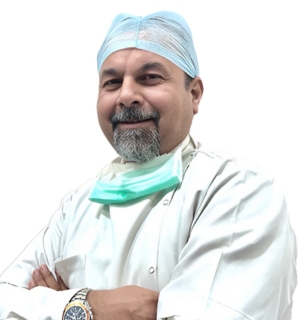
Dr. Balbir Singh Panwar( Panwar Dental Clinic & Implant Center )
Founder of Panwar Dental Clinic, Dr. Balbir is a certified Dentsply trainer and Osstem implants master faculty.
He is also an enterprising surgeon, the first to grow his practice using the Practo practice management software in the Tricity.
Education
- Rajiv Gandhi University Of Health Sciences, Bengaluru
- Course in Smile and Esthetic Dentistry, Leeds Metropolitan University, UK (2003)
- Advance Implant Course, Chicago, USA (2007)
- Professional Global Hiossen Course, University of Southern California, Los Angeles (2015)
Memberships
- American Dental Association
- International Congress of Oral Implantology
- Indian Dental Association
Want a FREE consultation?
Connect with us to solve all your queries with the best dentist in Panchkula
Things to do in Panchkula
If you're planning a trip to Panchkula, here are some must-visit attractions nearby:
- Rock Garden: Situated in Sector One, it's a unique sculpture garden made from recycled materials.
- Sukhna Lake: This popular tourist spot in Sector 6 is ideal for boating, picnics, and enjoying the scenic view.
- Zakir Hussain Rose Garden: Asia's largest rose garden, boasting over 1600 rose varieties, located in sector 16.
- Sector 17 Market: Known for its street food, local shops, and restaurants, it's the perfect place to enjoy local cuisine and pick up souvenirs.
Root Canal Treatment in Panchkula, Haryana: Before and After
Discover the transformative effects of RCT in Panchkula, through stunning before and after images.
RCT of Front Teeth Followed By Dental Crown - Case#1
RCT of Front Teeth Followed By Dental Crown - Case#2
Root Canal Treatment in Panchkula, Haryana: Reviews
Explore the experiences of patients who underwent root canal treatment in Panchkula, Haryana, sharing their satisfaction and outcomes.
Chaman SinghSingle Sitting RCT, Panchkula
I got my single sitting RCT done by Dr Balbir I was very comfortable during the procedure.
DeepakDental Work, Panchkula
Dr. Balbir is an absolute perfectionist, knowledgeable and keeps his patients very comfortable. We are coming to him for many years and trust him completely.
Rekha AshtRoot Canal Treatment, Panchkula
I am getting treatment here since last 15 years and very satisfied with all my treatment. I have got RCT and post and core built up.

ShiviDental Treatment, Panchkula
I wholeheartedly recommend Dr. Panwar to anyone seeking top-quality dental care. His expertise, combined with patient-centered approach, makes him standout in the field.
How Much Does a Root Canal Hurt on a Scale of 1 to 10?
On a scale of 1 to 10, the answer would be about 1.5. Endodontic treatment is nearly painless. Most patients get mild symptoms, if any. Research reported that 62% of patients felt no pain 7 days after the treatment.[9]
You may wonder, "How long does pain last after root canal treatment?" Typically, any discomfort lasts only a few days and can be managed with over-the-counter pain medication.
Is Capping Necessary After RCT?
The need for capping after RCT depends on the remaining tooth structure, functional demands, and aesthetic requirements of the tooth.
Anterior teeth may not always need capping since they primarily tear or bite food.
However, if aesthetics are compromised, they may require a dental crown.
In most cases, posterior teeth (molars and premolars) require a crown.
This is because they endure significant chewing forces, necessitating reinforcement.
In most cases, it is advisable to place final coronal restorations within the first two weeks after completing RCT. This lowers the risk of extraction of endodontically treated teeth (ETT).[10]
Research demonstrates that the timing of crown placement after endodontic treatment impacts the survival rate of the respective tooth.[11]
When compared to crown placement within the first 14 days:
- If capping is done 15–59 days after RCT, tooth extraction is 25% more likely.
- If capping is done 60 days after RCT, tooth extraction is 73% more likely.[12]
Which Cap Is Better for Teeth After a Root Canal?
Zirconia caps are better for teeth after RCT because:
- Zirconia crowns look like natural teeth.
- They are strong and durable, needing less replacement.
- Zirconia combines the benefits of metal and ceramic crowns:
- Minimal tooth preparation and easy to cement-like metal.
- Low thermal conductivity and natural tooth color like ceramic.[13]
How Much Does a Root Canal Cap Cost in Panchkula, Haryana?
Root canal cap cost in Panchkula, Haryana, ranges from INR 6000 ($72 or £60) to INR 45000 ($540 or £430), depending on the type of material used:
| Procedure | USD | GBP | AUD |
| PFM Crown | $110 | £90 | A$165 |
| Zirconia Crown | $145* $300** $540*** |
£115* £145** £240*** |
A$220* A$455** A$820*** |
| E-Max Crowns | $180* | £100 | A$275 |
| Metal Crowns (Base metal alloy) |
$75* | £47* | A$110* |
| Warranty | *5-year warranty | **15-year warranty | ***Lifetime warranty |
#Prices are case-dependent
What Happens if You Don’t Get a Cap After Root Canal?
If you don't get a cap after RCT, the tooth is at risk of reinfection due to microleakage. Additionally, biting forces can lead to a cracked tooth after root canal treatment, which may require extraction.
The type of restoration after RCT significantly impacts the survival of ETT, with dental crowns showing higher survival rates than fillings.
Overall, delayed placement of the final coronal restoration negatively affects the long-term survival rates of initial root canal treatment.[14]
Root Canal Treatment: Aftercare
Proper aftercare following RCT is crucial for ensuring a smooth recovery and long-term success.
Here's what to expect and tips to follow post-treatment:
What to expect?
- After RCT, you may experience mild pain or tenderness for 24-48 hours.
- Pain intensity may increase depending on the extent of infection in the surrounding bone and gums.
- Jaw soreness from prolonged mouth opening is common.
- Your dentist may suggest painkillers and antibiotics for 3-5 days.
- You can resume regular work on the same day.
- Connect with your dentist immediately if you experience severe pain, swelling, dislodgement of the filling or crown, or allergic reactions to medication.
Here are some tips to follow:
- Avoid eating until numbness wears off to prevent accidental biting.
- Take prescribed medications.
- Do not bite with the treated tooth until it is fully restored.
- Keep scheduled appointments for complete restoration.
- Maintain oral hygiene by brushing twice daily and flossing.
Source: AAE[15], PubMed[16]
Can a tooth hurt after a root canal treatment? If you're wondering the same, continue reading.
Root Canal Treatment: Side Effects
Let us understand the potential side effects of root canal treatment.
- Swelling and inflammation: Some individuals may experience swelling and inflammation around the treated tooth, which can be temporary and managed with ice packs and anti-inflammatory drugs.
- Sensitivity to temperatures: Sensitivity to hot and cold may occur for a few days after treatment, but it typically resolves on its own.
- Discolouration of the tooth: Occasionally, a tooth undergoing RCT may appear discoloured due to internal bleeding. Cosmetic dental procedures can address this issue.
- Infection: While rare, there is a risk of re-infection following RCT, typically from bacteria entering the tooth through a crack or injury.
Conclusion
Root canal treatment in Panchkula, Haryana, is safe and affordable. RCT is important for eliminating infection and relieving pain. Individuals can preserve their natural teeth and maintain oral health for years by opting for RCT.
FAQs
You should wait to eat something until the numbness from the anaesthesia wears off. This will prevent accidentally biting your lips, cheeks, or tongue.
For the first few days after the procedure, opt for a soft diet consisting of foods like yoghurt, mashed potatoes, oatmeal, and scrambled eggs. Avoid hard, hot, and spicy foods.
It's generally safe to drive home after a root canal. However, if you've been given medication to help you relax during the procedure, such as sedatives, it's best to have someone else drive you home. Always follow your dentist's instructions regarding driving and any medications you've been prescribed.
Root canal can be performed non-surgically in one day and is called ‘single-visit endodontics’ or ‘single-sitting RCT.’ This procedure includes access opening, cleaning and shaping, and root canal filling of the root canal system in a single sitting.[17]
While a tooth may survive without a cap for some time, its long-term survival significantly decreases.
Therefore, it's generally advisable to have a cap placed on the tooth as soon as possible after endodontic treatment to maximise its longevity and reduce the risk of failure.
According to research, the survival rate of ETT without crowns:
- At 1 year = 96%.
- By 2 years = 88%.
- At 5 years = 36%. However, the primary determinant of survival rate is the amount of residual tooth structure.[18]
Vacation with treatment?
Enjoy a relaxing vacation in the hills along with your painfree RCT
References
- AAE: What is a Root Canal
- NHS: Overview: Root Canal Treatment
- Cleveland Clinic: Root Canal
- AAE: Benefits of Root Canal Treatment
- PubMed: The Tennessee study: factors affecting treatment outcome and healing time following nonsurgical root canal treatment.
- Hindawi: Radiographic and Clinical Findings of Single-Visit Root Canal Treatments with Apical Enlargement in Necrotic Teeth: A Retrospective Cohort Study
- PubMed: Patient-centered Outcomes of Root Canal Treatment: A Cohort Follow-up Study
- ResearchGate: Effects of waiting time for definitive restorations after completion of root canal treatment (RCT)
- ResearchGate: Crown or not to Crown after RCT
- NLM: Survival Rates of Endodontically Treated Teeth After Placement of Definitive Coronal Restoration: 8-Year Retrospective Study
- PubMed: Zirconia crowns - the new standard for single-visit dentistry?
- AAE: Post Treatment Care
- IJCE: Single visit endodontics
- PubMed: Long-term survival of endodontically treated molars without crown coverage: a retrospective cohort study




